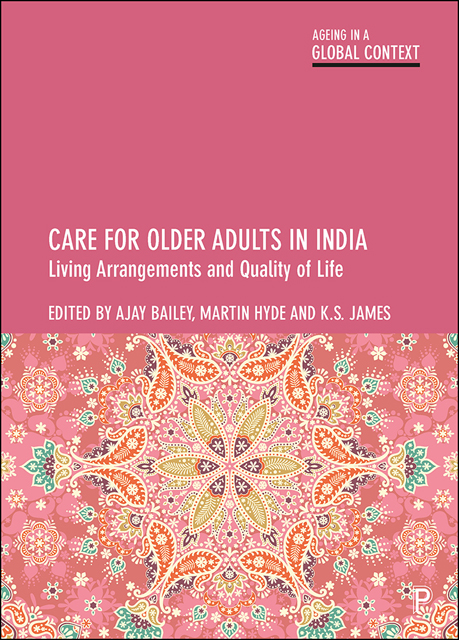Book contents
- Frontmatter
- Contents
- List of figures and tables
- Notes on the editors
- List of contributors
- Acknowledgements
- Series editors’ preface
- Map of India
- 1 Introduction: Living arrangements and care in India
- 2 Theorising care and relationships in the age of migration
- 3 Emerging living arrangements of older adults in India: patterns and welfare implications
- 4 Living arrangement concordance and the well-being of older persons in India
- 5 Family size and living arrangements among older adults in Kerala: panel data analysis, 2004– 19
- 6 Care arrangements for older adults: exploring the intergenerational contract in emigrant households of Goa, India
- 7 All my responsibilities towards my children are over! Linked lives and life course obligations among older adults with migrant children in India
- 8 Interpreting the landscapes of care for older men in Delhi and Kolkata: perspectives from care receivers and caregivers
- 9 The role of cultural meaning system and place attachment in retaining home ownership while residing in retirement homes in Kerala, India
- 10 Decision-making and choice or sine qua non? Care home entry in Tamil Nadu
- 11 Welfare and development programmes for older adults in India
- 12 Lessons and future directions for caregiving research in India
- Index
8 - Interpreting the landscapes of care for older men in Delhi and Kolkata: perspectives from care receivers and caregivers
Published online by Cambridge University Press: 13 October 2022
- Frontmatter
- Contents
- List of figures and tables
- Notes on the editors
- List of contributors
- Acknowledgements
- Series editors’ preface
- Map of India
- 1 Introduction: Living arrangements and care in India
- 2 Theorising care and relationships in the age of migration
- 3 Emerging living arrangements of older adults in India: patterns and welfare implications
- 4 Living arrangement concordance and the well-being of older persons in India
- 5 Family size and living arrangements among older adults in Kerala: panel data analysis, 2004– 19
- 6 Care arrangements for older adults: exploring the intergenerational contract in emigrant households of Goa, India
- 7 All my responsibilities towards my children are over! Linked lives and life course obligations among older adults with migrant children in India
- 8 Interpreting the landscapes of care for older men in Delhi and Kolkata: perspectives from care receivers and caregivers
- 9 The role of cultural meaning system and place attachment in retaining home ownership while residing in retirement homes in Kerala, India
- 10 Decision-making and choice or sine qua non? Care home entry in Tamil Nadu
- 11 Welfare and development programmes for older adults in India
- 12 Lessons and future directions for caregiving research in India
- Index
Summary
Introduction
The geographies of care literature covers care practices in its many different forms and spatial structures (Milligan, 2017; Hanrahan and Smith, 2020; Power and Williams, 2020), including home-based care negotiations (Button and Ncapai, 2019) in everyday care practices. Recently the landscapes of care or caringscapes have started to be mapped, investigating how different spatial cares are practised and perceived by different people (Meier and Bowman, 2017; Bowlby and McKie, 2019). Care and care relationships are located in, shaped by and shape particular spaces and places that range from local to global (Milligan and Wiles, 2010). Similarly, Lawson (2008) argues that the way care is understood, experienced and practised is shaped by socio-economic and political contexts. McKie et al (2002), while defining ‘caringscapes’, brought up two important points. First, caregiving is a social practice, is gendered and it is determined by the creative strategies of caregivers (largely women) in both professional and family settings (Power, 2016; Williams and Sethi, 2020). Second, care should be viewed as a fundamentally social, economic and cultural relationship. In addition, it is important to mention that caregiving in the Asian context, particularly in India, is mainly carried out by women, especially spouses and daughters-in-law (Ajay et al, 2017; Ugargol and Bailey, 2020). Female family members, traditionally, are expected to take care of older adults and children (Pillai et al, 2012; Ugargol et al, 2016). The synergy between the gendered nature of caregiving and its spatial dimension essentially engender the contextual caringscapes.
Caringscapes are developed through an individual's involvement with varied social landscapes of care, caregiving roles, employment and social policies, and gendered and generational expectations of care and work (McKie et al, 2002). To understand ‘care’, one needs to consider all those who are involved in the care relationship because the nature, extent and form of these relationships are affected by where they take place (Milligan and Wiles, 2010). Therefore, care is not only interpersonal relations but also people–place relationships. Critically, landscapes of care are both product of and produced by the social and political-institutional arrangements for care.
- Type
- Chapter
- Information
- Care for Older Adults in IndiaLiving Arrangements and Quality of Life, pp. 140 - 160Publisher: Bristol University PressPrint publication year: 2022



